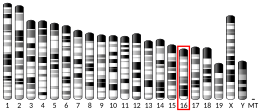Poly(adp-ribose) polymerase family member 14
Appearance
Poly(ADP-ribose) polymerase family member 14 is a protein that, in humans, is encoded by the PARP14 gene. [5]
Function
[edit]Poly(ADP-ribosyl)ation is an immediate DNA damage-dependent post-translational modification of histones and other nuclear proteins that contributes to the survival of injured proliferating cells. PARP14 belongs to the superfamily of enzymes that perform this modification (Ame et al., 2004 [PubMed 15273990]).
References
[edit]- ^ a b c GRCh38: Ensembl release 89: ENSG00000173193 – Ensembl, May 2017
- ^ a b c GRCm38: Ensembl release 89: ENSMUSG00000034422 – Ensembl, May 2017
- ^ "Human PubMed Reference:". National Center for Biotechnology Information, U.S. National Library of Medicine.
- ^ "Mouse PubMed Reference:". National Center for Biotechnology Information, U.S. National Library of Medicine.
- ^ "Entrez Gene: Poly(ADP-ribose) polymerase family member 14". Retrieved 2016-03-02.
Further reading
[edit]This article incorporates text from the United States National Library of Medicine, which is in the public domain.




